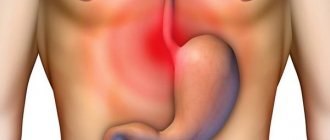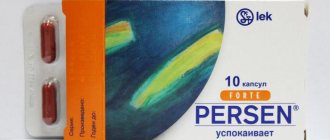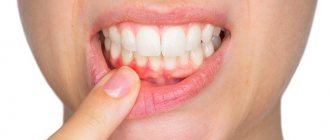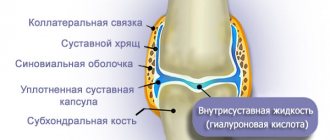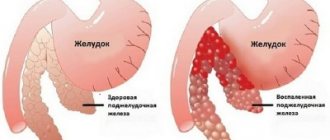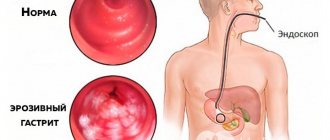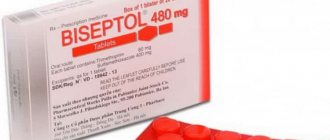From this article you will learn:
- the best tablets for toothache: fast and effective,
- folk remedies for toothache at home,
- safe analgesics for pregnant women,
- drug rating 2019.
Acute toothache usually occurs only in 2 situations... Firstly, with pulpitis, i.e. with inflammation of the nerve in the tooth. This occurs when a patient has untreated caries, and there comes a point when the carious cavity becomes so deep that the infection from it penetrates into the tooth cavity in which the nerve is located.
Secondly, with periodontitis, when the infection penetrates beyond the boundaries of the tooth, and a purulent periodontal abscess forms at the apex of the roots. Such an inflammatory process usually occurs either as a consequence of pulpitis that is not cured in time, or after poor-quality root canal filling in the past.
Above we have listed the typical causes of toothache. Below we will tell you how to relieve toothache at home quickly with the help of analgesics, folk remedies, and also in what cases emergency first aid for toothache is needed, even at night in a 24-hour dental clinic.
General recommendations for use
- tablets that relieve toothache are excellently absorbed by the gastrointestinal tract and excreted from the body by the kidneys, so patients with kidney problems should be especially careful when using painkillers,
- Almost all of these tablets pass into breast milk and across the placental barrier, so it is not recommended for pregnant women to take them. As an alternative, rinse can be used. Please note that each drug has its own contraindications and side effects, so before taking the medicine you need to carefully study the instructions.
What to do if your teeth hurt
If pain occurs in the oral cavity, you need to brush your teeth or simply rinse your mouth. The fact is that the gums usually start to hurt when eating, so it is necessary to get rid of food particles. One of the effective solutions for rinsing your mouth is sea water, which you can prepare yourself at home. To do this you will need: a glass of boiled water, a teaspoon of salt and soda, and 2-3 drops of iodine. It is worth noting that in some cases, rinsing the mouth with sea water is enough to get rid of toothache in an adult.
Classification of drugs
Medicines for toothache can be divided into 3 groups:
- painkillers;
- anti-inflammatory;
- freezing.
The first group includes non-steroidal anti-inflammatory drugs and local anesthesia. They include: actasulide, ibufen, askofen, ketanov, no-shpu, etc.
Important All of them have certain contraindications, as well as age limits. Please read the instructions carefully before use. It is also worth remembering that they can only provide pain relief for a certain period of time.
The second group of remedies can relieve not only pain, but also help reduce inflammation. These include: aspirin, ketorol, brufen, nise, etc.
The third group consists of freezing gels, such as Metrogil-denta, Kamistad, Dentol, etc. They are considered the most effective method in the fight against toothache. In addition, some of them are safe even for children, which is why they are used to relieve teething pain.
The best (effective) tablets for toothache.
Ketanov
The drug against toothache is actively purchased and consumed by people, as it is cheap and gives a very good effect.
It is recommended to use it once a day - a tablet is enough to eliminate pain.
The product can cope even with acute discomfort.
But it is important to remember the contraindications:
- time of gestation or breastfeeding,
- kidney or liver problems,
- gastrointestinal pain,
- individual intolerance to the composition.
Nise
The fast-acting drug is considered one of the best for post-traumatic and muscle pain.
In addition, it is often prescribed by doctors in case of tissue inflammation. The tablets relieve pain perfectly and cause virtually no side effects.
In addition, it can be purchased without a doctor’s prescription and at a very reasonable cost.
Aspirin
A fairly popular remedy is actively used for various purposes, including for toothache. It affects the problem area in the tooth itself, due to which it quickly eliminates pain.
According to experts, these tablets can be safely taken even in the presence of pulpitis, as well as inflammatory processes in the dental neurovascular bundle.
Nurofen
An excellent drug relieves pain and reduces inflammation.
It contains codeine, which acts as a strong analgesic. The drug must be taken only in the specified dosage, which depends on the patient’s age, otherwise side effects such as headaches and loss of consciousness cannot be avoided.
Contraindications include: Crohn's disease, renal and liver failure.
Took
The tablets combine two actions at once - combiotic and antispasmodic. They cope with both mild and moderate pain.
The product begins to act half an hour after administration.
And the main advantage of the medicine is the fact that it can be used by children at any age, but in the appropriate dosage.
As for contraindications, these include:
- pregnancy,
- lactation,
- taking other medications,
- liver problems.
Baralgin
The remedy is often prescribed by specialists for severe toothache, as it is fast-acting. You are allowed to take no more than two tablets per day.
But when taking it, you should observe contraindications:
- developing asthma,
- liver failure,
- period of gestation.
Nimesulide
An almost universal medicine that helps not only with toothache, but also with unpleasant sensations in the head, neuralgia, and arthritis.
Tablets quickly eliminate pain, but they cannot be used for therapy, since the pain will soon return if you do not consult a dentist.
For best effect, the product should be taken during or after meals.
Contraindications include:
- age up to 12 years,
- pregnancy,
- heart and gastrointestinal diseases.
Analgin
The product is considered an excellent representative of the ideal balance between cost and quality.
It effectively copes with mild pain, but when taking it, it is worth remembering that the composition can destroy enamel and weaken the immune system.
In addition, it is not recommended to combine it with other pain-relieving tablets.
Paracetamol
Completely safe tablets are suitable even for severe pain. Before taking, they must be dissolved in water, due to which the specific taste is less noticeable.
And the main advantage of this remedy is the absence of contraindications, if, of course, it is taken in moderate doses.
Dexalgin
An equally effective remedy is famous for its favorable price and the absence of the need to obtain a prescription for purchase at a pharmacy, due to which it becomes more accessible to society.
The tablets make it possible to forget about pain within 10-20 minutes after taking it. Consumers claim that the composition is anesthetic and does its job really well.
But taking the medicine is prohibited if the patient is individually intolerant to its components, as well as in the presence of intestinal ulcers.
Ketorol
A representative of the category of non-steroidal drugs has anti-inflammatory and analgesic effects.
It can be used to relieve toothache and headaches, as well as to alleviate injuries.
Among the contraindications:
- age up to 16 years,
- problems with the gastrointestinal tract,
- liver,
- heart and kidneys.
You are allowed to take up to four tablets per day.
Drotaverine
A highly effective, high-quality drug is sold at an affordable price, so everyone can afford it.
It can eliminate even acute pain. To get the desired result, you only need to take one tablet and wait up to half an hour.
However, the composition is not recommended for use by pregnant or lactating women, as well as children under 12 years of age.
Tsiprolet
One of the best fast-acting antibiotic drugs is able to actively fight many pathogenic microorganisms.
The drug is prohibited for use by children under 14 years of age, as well as by those with colitis of various etiologies.
Despite the contraindications, doctors still sometimes prescribe this medicine to patients without adhering to them, but in a reduced dosage.
As a rule, this remedy is used by people undergoing a whole course of treatment at the dentist, since between sessions the teeth can hurt quite a lot and cause discomfort.
The only thing you need to know when taking the composition is that you need to do it exclusively on an empty stomach.
Tempalgin
An excellent medicine against any pain, suitable for teenagers and adults.
Tablets of this type additionally eliminate inflammation.
However, there are not too many contraindications here:
- kidney diseases,
- asthma,
- pregnancy.
Ibuprofen
The product, actively advertised on TV, consists of a substance of the same name, which always perfectly relieves pain of mild to moderate intensity.
Experts allow taking up to seven tablets per day. The effect of the medicine begins only 40 minutes after consumption, so you should not drink the entire permitted dosage at once.
The absence of pain after taking the pills will last about 6 hours.
Like any product, there are specific contraindications that are not recommended to be ignored:
- allergic reactions to the composition,
- blood diseases,
- kidney disorders,
- heart ailments,
- lactation,
- bearing a fetus.
Moment
This product is based on ibuprofen, so it gives no less effect than the previous medicine.
It eliminates not only pain, but also other symptoms such as fever, headache and chills.
The effect of the tablets begins within half an hour after administration.
Experts allow taking the drug up to three times a day, although such a frequency is required in rare cases, since the composition is very effective. However, it should not be used for more than a week.
Contraindications include:
- diseases of the blood and optic nerve,
- ulcer,
- period of gestation and lactation.
Nimesil
This remedy combines several effects:
- anti-inflammatory,
- antipyretic
- and pain reliever.
There are practically no contraindications to its use, with the exception of age under 12 years, fever and alcoholism.
This drug can be found on sale not only in the form of tablets, but also in the form of tea bags - in any case, the effect will be quick.
In addition, after the drug begins to act, you may not remember the pain for the next 8-9 hours. The drug can be prescribed by a doctor, but it is available in pharmacies without a prescription.
Spasmalgon
Painkiller tablets, popular in Russia, cope with pain of mild to moderate intensity.
Additionally, they work as an antipyretic.
Although the effect of this product is amazing, there are many contraindications to its use, unlike other compounds in this rating:
- age up to 7 years,
- gastrointestinal diseases,
- malfunction of the hematopoietic system,
- heart ailments,
- glaucoma.
Fanigan
This drug combines two analgesics - paracetamol and diclofenac. Thanks to this combination, the analgesic effect is significantly enhanced.
This product actively combats unpleasant sensations in the oral cavity in children and adults.
Additionally, it has an anti-edematous effect, due to which it unloads collagen and fibrin fibers that can increase in size during inflammatory processes.
Among the negative aspects of these tablets, it is worth noting the presence of acids in the composition that irritate the mucous membrane of the gastrointestinal tract, but this does not indicate that the drug is very dangerous, but only the need to eat food before consuming the drug.
If a pregnant woman has a toothache
During the period of bearing a child, it is better to avoid drug treatment altogether and deal with pain with compresses or rinses. If the pain is unbearable, it is permissible to take a paracetamol tablet. In addition to it, you can use aspirin, spasmalgon, baralgin, analgin, but provided there are no more than two of them.
Important ! The trimester of pregnancy is of great importance. The first and last ones are considered especially dangerous, when malformations may occur or premature birth may begin. At this time, you should try to avoid taking medications.
Elimination of toothache during pregnancy
Until a woman’s placenta has formed during pregnancy (this process lasts up to 3 months), taking painkillers is prohibited. Ideally, when planning conception, it is better for a woman to undergo a full examination by a dentist to identify the presence of diseases in the oral cavity.
If there are any, treat them before pregnancy occurs.
In the first 12 weeks of pregnancy, it is better to use traditional methods of combating toothache, so as not to expose the fetus to the negative effects of medications. After this period, if the pain becomes completely unbearable, you can take painkillers. Now we will list those that, subject to adequate dosage, are quite applicable in relieving toothache during pregnancy.
Paracetamol – has both antipyretic and analgesic properties. Due to the fact that its active components are quickly absorbed into the blood, its healing effect is felt quite well. It is considered one of the safest medicines for pregnant women. Women who have liver disease should not take paracetamol.
Drotaverine, but-spa is considered a weak drug, so it is not able to eliminate severe toothache, but it does a good job of combating wave-like, mild aching pain in the teeth.
Ibuprofen is an effective drug that will relieve toothache and partially inflammation, but it must be used exactly following the instructions or instructions of the doctor.
Ibuprofen is contraindicated in the third trimester. During this period, it may have an undesirable effect - a decrease in the amount of amniotic fluid, which negatively affects the child.
During lactation, many components of medications can penetrate into milk and, accordingly, through it into the child’s body. Don't forget about it!
During this period, women are especially vulnerable to various ailments and external irritants. During pregnancy, hormonal changes occur in many body systems, which significantly affects the condition of organs. Therefore, toothache during this period is not at all a rare phenomenon. You can take the above medications only in cases where it is not possible to urgently consult a dentist. If you can go to the dentist, then you shouldn’t put it off until later. Only an experienced professional dentist can help you get rid of problems in the oral cavity and prescribe the necessary and safe tablets for toothache.
Painkillers for children
If tooth pain torments a child, you should use medications with caution, since many of them are contraindicated in childhood. In this case, it is worth trying various folk methods at home (for example, rinsing with herbal decoctions). If they do not work, you can pay attention to drugs containing paracetamol or ibuprofen.
Important ! The maximum dose of paracetamol for a child is 2 g per day.
This is basic information about medications that are designed to help cope with pain. You should also carefully read the instructions for medications and regularly visit a specialist’s office in order to always be able to eliminate the need for painkillers in a timely manner.
Proven methods to combat toothache
There are situations when, for one reason or another, it is impossible to use an anesthetic. But everyone knows that oral diseases have always existed. In other words, there are not only medical, but also folk methods that can be used to relieve toothache at home.
- Perhaps every home has ingredients such as onions and garlic. The antiseptic properties of these plants may be effective against pain. To do this, you should use onion juice, which is obtained by boiling or chopping, or a clove of garlic. Dip a cotton ball into the juice of the plant and apply it to the sore spot. Garlic cloves are applied to the gums in their pure form.
- One of the most common folk pain relievers are essential oils. Thus, Kayaput oil is considered the most effective. To prepare a compress, simply apply 5 drops of oil to a bandage or cotton wool and apply to the sore area. However, it is not necessary to make a compress: cotton wool can be applied to the inflamed gum. Cajput oil has not only anti-inflammatory, but also antiseptic effects.
- Another popular method is chamomile decoction. To do this, place 2 teaspoons of herbs in a container, pour boiling water over them and place in a water bath. Infuse the decoction for 15-20 minutes. After the liquid has cooled, you can start rinsing your mouth.
Another easy recipe is an infusion of sage or calendula. To do this, pour boiling water over one tablespoon of leaves and leave until warm. The liquid can then be used as a mouth rinse.
Freezing drugs
In addition to conventional NSAIDs, special topical dental preparations have been created to eliminate toothache. Their advantages include guaranteed action and minimal likelihood of side effects. Moreover, various gels and sprays are no more expensive than anti-inflammatory tablets. Topical dental preparations include:
- Dentamet gel. Has a freezing and antimicrobial effect. It is recommended to apply the gel using a toothbrush, after brushing your teeth. Dentamet gel 25 grams can be purchased in pharmacies for an average of 150 rubles.
- Metrogil Denta. Along with the above medicine, it consists of an antibiotic and an antiseptic. Has a freezing and antimicrobial effect. The cost of a 20 gram tube reaches an average of 230 rubles.
Help with pulpitis
Acute pulpitis
Without proper treatment, caries can develop into pulpitis. The pain syndrome with it is more pronounced, occurs without a reason, the pain intensity is very high. The attacks last a long time, they are especially pronounced at night.
You can somewhat reduce inflammation and quickly relieve toothache due to pulpitis using the same folk remedies as for tooth root abscess.
Effective recipes against pulpitis
- Add a few drops of lemon juice and twenty drops of hydrogen peroxide to half a tablespoon of baking soda. The mixture is placed in the hollow of the diseased tooth and used to numb the gums. The intensity of the pain syndrome noticeably decreases after fifteen minutes.
- Place half of the No-shpa tablet into the tooth cavity. If the inflammatory process begins under the filling, the tablet is applied to the back wall of the tooth. No-spa relieves pain gradually: as it dissolves.
Nise
These tablets belong to the group of non-steroidal anti-inflammatory drugs. The active ingredient is nimesulide. It slows down and practically prevents the synthesis of prostaglandin, thereby relieving inflammation.
The drug does not affect hemostasis (a complex system that keeps the blood in a normal state and prevents damage to blood vessels). And also, which is very important for inflammation, phagocytosis is a process in which special cells in the blood capture and dissolve all kinds of microorganisms.
Helps well with moderate pain due to caries, as well as the initial stage of pulpitis
. This medicine cannot completely relieve inflammation, so even if the pain syndrome is eliminated, you should consult a doctor.
Contraindications
You should not take Nise in the following cases:
- pregnancy;
- breastfeeding period;
- children under two years old;
- with severe liver dysfunction;
- if there is severe renal failure.
special instructions
Adults can take up to four 50 mg tablets per day, the maximum dose is 400 mg. When taken correctly, it has virtually no negative side effects.
For gum inflammation, you can also use Nise in gel form - just rub a small amount into the damaged area. Swallowing it is not recommended.
Ketorol
One of the most potent remedies, therefore it is not recommended to take it unless absolutely necessary. Tablets 10 mg, active ingredient – ketorolac tromethamine.
Depending on the severity of the pain, you can take one tablet a day or repeat the dose after a few hours. It is advisable not to take more than 4 tablets per day, as the risk of various side effects increases.
Action
This drug, like the previous one, is classified as a non-steroidal anti-inflammatory drug. Its analgesic effect is most pronounced.
With its help, the transmission of nerve impulses from the source of irritation is slowed down and blocked for some time by blocking them in the central nervous system. Thus, the pain signal simply stops coming, it is simply not processed by the brain and does not cause a response.
Although the drug is quite close to a narcotic, it is still not one. Therefore, it is not addictive or dependent.
Contraindications and additional information
You should not take Ketorol if you have serious problems with the liver and kidneys, during lactation and pregnancy. It is also advisable to refrain from taking it to children under 16 years of age.
This drug cannot also be combined with other non-steroidal anti-inflammatory drugs, as the toxicity of its components may increase.
Solutions and tinctures for pain relief
If you don’t have medicinal herbs on hand, you can relieve severe pain with alcohol tinctures or prepare special rinsing solutions from ingredients that can be found in every home.
Solutions of salt, soda, iodine, mumiyo, alcohol infusions will temporarily reduce pain in the oral cavity.
- Salt with iodine. Dissolve 1 teaspoon of table salt in a glass of warm water and add 7 drops of iodine. Stir until the salt is completely dissolved and rinse your mouth well. The pain becomes less after the first use. Use no more than three glasses of solution per day so as not to burn the mucous membrane.
- Soda. Dissolve 0.5 teaspoons of baking soda in a glass of warm water. The rinse solution is ready.
- Hydrogen peroxide. Pour 2 teaspoons of peroxide into a glass of water and stir.
- Beetroot juice. If you have a juicer, make beet juice, put it in your mouth and hold it for a few minutes. You can apply a piece of beetroot to the gum. It only helps if the pain is not severe.
- Mumiyo. Buy a mummy solution at the pharmacy, which can be used for rinsing. It does not give a strong effect, but it is suitable for children.
- Propolis and calamus. If your teeth often hurt, prepare a tincture of propolis and calamus root for rinsing in advance. Take 0.5 liters of vodka, pour 100 g of calamus into it, shake, let it brew in a dark place for at least 10 days. Pour 30 g of crushed propolis into 200 ml of vodka and leave for 10 days. Keep the prepared tinctures in the refrigerator. They should be mixed immediately before rinsing. Calamus tincture you need to take 1 tbsp. spoon, and propolis - 0.5 tbsp. spoons. Mix them in a separate container, put them in your mouth and rinse for 3 minutes. It will sting a lot at first, but over time you will get used to it.
- Vodka. If you don’t have any alcohol tinctures on hand, and herbal infusions don’t help enough, you can try rinsing your mouth with regular vodka. However, do not do this too often, otherwise you will burn the mucous membrane.
Prices
Here is the approximate cost of the listed drugs in pharmacies across the country. The price range indicated is in rubles. The cost varies greatly depending on which pharmacy chain the purchase is made from, as well as the location of the pharmacy.
- Paracetamol - from 20 to 50.
- Nise - from 170 to 300.
- Nurofen – from 80 to 100.
- Nurofen plus – from 250 to 500.
- Ketorol – from 40 to 45.
- No-shpa - from 200 to 220.
If you find an error, please select a piece of text and press Ctrl+Enter.
Tags toothache pills
Did you like the article? stay tuned
Previous article
The jaw clicks when you open your mouth: why does this happen, how to get rid of it?
Next article
Causes of black plaque on the tongue
If it hurts from cold, hot or sweet
If you have a toothache, you should schedule a visit to your doctor. Any pain-relieving methods eliminate symptoms, but do not provide treatment. If you start the disease, you will get complications and lose a tooth. Contraindications for use should be taken into account. You will provide first aid to yourself and your child using:
- medications in tablet form;
- injections;
- homeopathic remedies;
- candles;
- gels;
- rinsing;
- acupressure;
- folk remedies.
We suggest you read: The gums are inflamed under a dental bridge, what to do?
At a certain stage of the disease (in particular, with gangrenous pulpitis), rinsing with cold water can help. Please note, under no circumstances is it icy. Rather, we are talking about water at room temperature, which is perceived by our body as cold.
https://www.youtube.com/watch?v=JsjcJyXSrfc
It will not be possible to completely remove toothache, but it is quite possible to alleviate your condition a little. When cooled, tissue swelling decreases slightly and the feeling of fullness goes away. When heated, the pain occurs again, some feel it with a vengeance. Regular rinsing every 5-10 minutes will help you get to the doctor, but will not remove the cause.
It is not recommended to use ice water for such purposes, since with a large temperature difference, cracking of the enamel is possible. This effect is especially unfavorable in cases of hypersensitivity. You can try to apply any cold object to the cheek on the sore side, but, again, not for long, to avoid possible inflammation of the trigeminal nerve (and this is another and also not a very funny story).
Important. Do not warm the cheek on the sore side and do not rinse your mouth with hot water. It's not guaranteed to help, and it's sure to make things worse.
Physiologically, the most difficult time for a person is from midnight to 5 am. By evening, the level of corticosteroids in the blood decreases, which reduce pain. That is, by night a person is left alone with himself, in this case with his pain.
Unbearable night pain is characteristic of pulpitis. In a horizontal position, blood rushes to the head, increasing pressure on the nerve roots. The “half-sitting” position will help ease the situation a little. Raise the pillow higher so that your head is higher than your torso.
It is unlikely that shallow caries will make itself felt at night, but if you have periodontitis, periodontitis and gingivitis, such manifestations are quite real. The pain can be pulsating, localized, and accompanied by an additional burning sensation. In the worst cases, it feels like half your head hurts.
Mild pain may occur the first night after a nerve or tooth is removed. Take a tablet, rinse your mouth with a soda solution - these simple steps should help you quickly. You can also use folk remedies - clove oil, apply garlic.
As an option for severe pain, apply something cold to your cheek. Ice or even a piece of frozen meat will do. The only thing is to wrap it in a cloth or towel. Take any of the analgesics - Nurofen, Analgin, Ibuprofen, Nise, Tempalgin, Pentalgin, Ketorol.
Need to know. No-shpa tablets do not help against toothache; there is no point in taking them.
In some situations, not taking action can have a detrimental effect on your health. Turning to folk remedies or tablets from your home medicine cabinet will result in a loss of time and a deterioration in your condition.
If you notice at night:
- temperature increase;
- severe swelling on one side of the face;
- difficulty breathing and swallowing;
- cardiopalmus;
- loss of sensation in the affected part of the head
We call an ambulance or look for a clinic that provides 24-hour dental care.
Important. Breathing problems are especially dangerous, which may indicate incipient swelling of the larynx.
Quite often a person perceives pain as toothache, although its cause lies in diseases of a fundamentally different nature. This pain also appears or intensifies at night or late in the evening.
We are talking about diseases such as:
- Inflammation of the trigeminal nerve. The branches of the nerve are located very close to the roots of the teeth; when inflammation occurs, pain similar to toothache occurs. The nature of the pain is nagging and at times quite strong, localized or spreading throughout the jaw.
- Sinusitis, sinusitis, otitis. Accumulated in the sinuses and tissues, purulent accumulations put pressure on the roots of the teeth, causing discomfort. Quite often, a similar situation occurs in children who find it difficult to determine the source of pain.
- Stress. Night toothache occurs as a reaction of the body to constant nervous tension.
Only a doctor can determine the cause. To make a correct diagnosis, you will still have to visit a dentist to rule out diseases of the teeth and oral cavity. Therefore, we recommend not to delay visiting the doctor in order to avoid possible complications as much as possible.
If you still reach this state or the pain arose suddenly (this no longer matters), painkillers do not help in any quantity, look for a way out of the situation. It is better if you still consult a doctor.
When medications do not help, this means that the inflammatory process has reached such an extent that the tooth must be opened immediately. Wild pain, this is how everyone who has experienced it characterizes this condition. Nothing will help here - neither compresses, nor folk remedies, nor tablets. The accumulated pus puts pressure on the tissue, the pain becomes unbearable.
There are 24-hour dental services at night; find the phone number on the Internet, call and arrange a visit. Toothache is dangerous because it completely exhausts a person. You shouldn't bring yourself to this state.
If you think that you can hold out until the morning or until the appointed time, try to distract yourself or apply psychological techniques on yourself. It's better if you are on the move. Some active actions will shift your attention, and you will feel a little better.
If you notice that your medications are no longer working, you should no longer take them. An overdose and an allergic reaction are possible, in which case you will need to call an ambulance.
Let's just say, a one-time pain that is a harbinger of caries or thinning of the enamel. Decoctions of chamomile, sage and oak bark help well in these cases. Why a tooth reacts to cold is described in detail in this article.
It is not always acceptable to use analgesics to eliminate toothache. Pregnant women, children and people with contraindications to painkillers should use traditional methods. The most effective and safe folk method of relieving pain in the mouth is rinsing with soda and salt; dentists recommend using it as an emergency aid even for pregnant women and children.
Other folk remedies that are highly effective are also used:
- Fir oil helps reduce the intensity of even severe pain. It is necessary to moisten a cotton pad in oil and apply it to the inflamed area. Relief will come within 10–15 minutes.
- A clove of garlic, cut lengthwise, is applied with the cut side to the wrist opposite the inflamed tooth. The garlic is fixed on the hand with a bandage or tape; the clove of garlic should be removed after half an hour. The essence of the method is that hot garlic essential oils irritate the skin, thereby causing increased blood flow in the area farthest from the diseased tooth.
- Manganese solution in low concentration is safe and has antiseptic properties. Manganese mouth rinses help to briefly relieve the condition of mild pain.
- Crushed Kalanchoe releases essential oils that have an anesthetic effect. The leaf of the plant is finely chopped and wrapped in a bandage, after which it is applied to the diseased area.
- Applying a magnet to the cheek is a controversial and inexplicable method of traditional medicine, but there are reviews of its high effectiveness for toothache. You need to apply the magnet to your cheek on the side of the diseased tooth, and hold it for about half an hour.
- Propolis helps well with toothache if the pain is caused by a filling falling out. A piece of propolis is kneaded in the hands and applied to the place of loss.
We suggest you read: The best painkillers for abdominal pain
An immediate visit to the doctor is necessary if the toothache is not relieved either by tablets or folk remedies, or if signs of the development of an inflammatory process appear - constant pulsation, swelling on the cheek, redness of the gums. Such symptoms may indicate advanced caries, gum injury, gingivitis, periodontitis, pulpitis, hypersensitivity from thinning enamel. Diseases are fraught with serious complications, so they should not be neglected.
Before choosing a medicine for toothache, you need to accept the fact that its effect will be short-lived. Pain relief for toothache acts as a temporary measure. His task is to alleviate the patient’s condition until he seeks medical help.
Depending on whether the tooth hurts badly or the sensations are more like unpleasant discomfort, the choice of drug will depend. Some medications can relieve pain for quite a long time, others - only for a couple of hours, because painkillers for toothache are divided into strong and weak drugs. The choice of remedy differs for different intensities of pain: some medications simply cannot relieve sharp and severe pain.
Sometimes toothache is simply unbearable
. It is best if the doctor chooses the drug. He will be able to take into account the nature of pain, the presence of contraindications to taking the medicine, and possible side effects from use in each individual patient. But in reality, each patient independently chooses painkillers, trusting advertising, advice from friends or recommendations from pharmacists. To better understand which toothaches require which type of pain medication, you should study the most popular pain medications.
ethnoscience
Folk recipes also do not stand aside. Many people call them effective and use them before taking on chemicals.
Essential oils
Camphor, fir or clove oils help well. To use this folk recipe, do the following:
- soak a cotton swab or a piece of gauze with oil;
- Apply to the sore spot until the sensitivity goes away. Repeat the procedure if necessary.
Try it also after treatment or tooth extraction.
Alcohol tinctures
Take tincture of propolis, valerian or eucalyptus. These plants soothe muscles and nerve endings.
The recipe for this remedy is simple:
- blot cotton wool or gauze with alcohol tincture;
- Apply the compress to the sore tooth until the sensitivity subsides.
Propolis
A popular folk remedy in rural areas. Propolis is known for its anti-inflammatory and soothing properties, which is why it is used for toothache. Even children are allowed to use it.
It's simple:
- take a small ball of propolis;
- press into a sensitive area;
- if after 12 hours the pain has not gone away, repeat the procedure.
Salo
Cold salted lard cools the tooth, and the enzymes it secretes have a calming effect on the nerve endings, eliminating spasm. To use this recipe, you must do the following:
- cut off a small piece of lard;
- apply it to the inflamed area for several hours until the illness goes away.
If your tooth hurts after nerve removal
Even several hours after removal of the nerve, pain may be felt in the damaged tooth - when pressing, when biting, or slightly throbbing. This is a normal reaction of the body to intervention.
What to do:
If the pain does not subside or even intensifies, you will have to return to the doctor.
Even several hours after removal of the nerve, pain may be felt in the damaged tooth - when pressing, when biting, or slightly throbbing. This is a normal reaction of the body to intervention.
A filled tooth may manifest itself due to hypothermia or inflammation inside. In any case, you should drink painkillers and regularly rinse your mouth with warm herbal decoctions or water with soda and salt.
The main causes of toothache include:
- Caries. The initial stage is characterized by the destruction of the upper tooth tissues. The pain occurs periodically or one-time - the tooth reacts to pressure, cold and hot.
- Deep caries. The middle tissues of the tooth are affected, the pain becomes more prolonged, aching or throbbing.
- Pulpitis, the result of untreated caries. A nerve has been hit. The pain is severe and incessant.
- Periodontitis. Inflammation of the tissues around the roots of the teeth. It occurs as a consequence of pulpitis or after erroneous medical procedures. The pain is acute, intense.
- Residues of food stuck between teeth, even healthy ones. First there is a feeling of discomfort, then a pressing pain that can cover the entire jaw. Use dental floss or metal (dental) tape.
For children
Not all medications are approved for young patients. However, many can be taken at a very tender age - from two years.
- Panadol
. This remedy can be given to children from the age of six. Maximum per day – up to four tablets. If the need is very strong and at a younger age (but not younger than 3), you can give the child half of one dose - 250 mg. - Nurofen
. Not recommended for children under 6 years of age. - Ketanov
. Can only be given to older children - from 15 years of age.
Dentists' recommendations
Doctors do not recommend applying tablets to the gums for toothache, as this can lead to a burn of the mucous membrane. Dentists warn that some actions can increase pain. For example:
- adoption of a horizontal body position;
- warming up a diseased tooth;
- jaw movements.
Dentists recommend protecting your teeth from excessive stress, maintaining oral hygiene and contacting them for advice at least twice a year.
